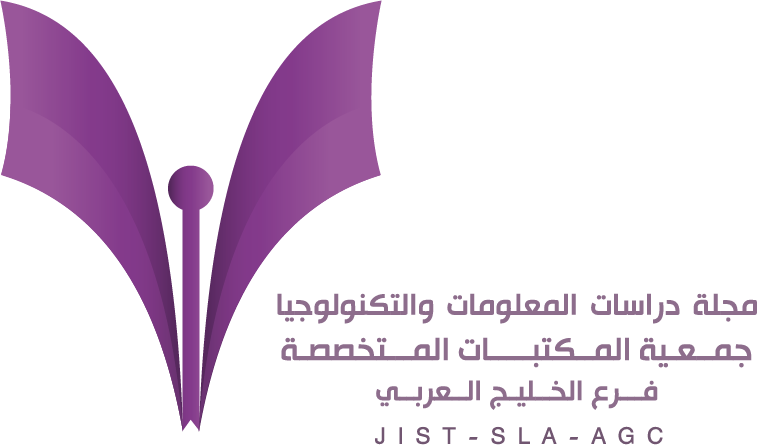- Home
- A-Z Publications
- Journal of Information Studies & Technology (JIS&T)
- Previous Issues
- Volume 2024, Issue 2
Journal of Information Studies & Technology (JIS&T) - Volume 2024, Issue 2
Volume 2024, Issue 2
- Editorial
- Research Article
-
-
Tacit knowledge sharing in organizations: Evidence from a qualitative analysis of the Ministry of Hajj and Umrah’s Agency for Visiting Affairs, Saudi Arabia
More LessTacit knowledge in organizations has many potential benefits. To unlock them, organizations must skillfully facilitate members’ sharing of tacit knowledge in ways that often do not apply to the sharing of explicit knowledge. The aim of this qualitative study is to clarify both the extent and the form of tacit knowledge sharing in an important Saudi Arabian ministerial agency: the Agency for Visiting Affairs in the Mini Read More - Top
-
- Systematic Review
-
-
نظم إدارة المحتوى الذكية: مراجعة علمية منهجية
More Lessالملخص أدت الزيادة المطردة في حجم المعلومات إلى خلق تحديات متزايدة لإدارة هذا المد المتنامي من المعلومات، سواء على المستوى الداخلي للمؤسسة أو على المستوى الخارجي، أتاحت معها تقنيات المعلومات إمكانات هائلة للمؤسسات لابتكار طرق جديدة لإدارة هذا المحتوى وتعظيم الاستفادة منه، من خلال تنظيم البيانات، وتحديد السمات والعلاقات والخرائط التنظيمية التي تعكس المشهد المتكامل للعمل داخل المؤسسة. وفي هذه الدراسة، قام الباحث بإجراء مراجعة منهجية واسعة النطاق لجوانب م Read More - Top
-
- Research Article
-
-
اتجاهات طلبة قسم دراسات المعلومات في كلية التربية الأساسية بالكويت نحو استخدام تقنية ChatGPT في إعداد الأبحاث الأكاديمية
More LessAuthors: طلال رجا العازمي, عبد العزيز عبد الله الكندري and عوض حمود الحربيالملخص هدفت الدراسة إلى تحديد مستوى معرفة طلبة قسم دراسات المعلومات في كلية التربية الأساسية(الكويت) بالمهارات المرتبطة باستخدام تقنية ChatGPT، والكشف عن اتجاهاتهم نحو استخدام تقنية ChatGPT في إعداد الأبحاث الأكاديمية، ومعرفة أبرز تطبيقات الذكاء الاصطناعي التي يمكن توظيفها في التعليم الجامعي. واعتمدت الدراسة الطريقة الكَمّية من خلال المنهج الوصفي المسحي؛ إذ تم توزيع استبانة على عينة بلغت 180 طالباً وطالبة. وأظهرت نتائج الدراسة أن أبرز تطبيقات الذكاء الاصطنا Read More -
المكتبات الأكاديمية وثقافة الاقتصاد البنفسجي: بين الواقع والمأمول
More LessAuthors: سالمة سليمان الريامي, فاتن فتحي محمد حمد and نبهان بن حارث الحراصيالملخص هدفت هذه الدراسة للتعرفِ على مساهمة وممارسات المكتبات الأكاديمية في سلطنة عمان في تعزيز ثقافة الاقتصاد البنفسجي. اعتمدت الدراسة على المنهج الوصفي النوعي بأسلوب المسح (المنهج المسحي). تمثلت أداة الدراسة في المُقابلة شبه المُقننة، إذ بلغ عدد المقابلات التي تم إجراؤها 12 مُقابلة شملت عينة الدراسة المُتمثلة في عينة قصدية مؤلفة من 6 جامعات حكومية وخاصة في محافظة مسقط بسلطنة عمان. كشفت الدراسة عن عدد من النتائج، من بينها أن المكتبات الأكاديمية في سلطنة Read More -
Strengthening big data security and privacy in libraries: A Review of ISO standards and real-world cyberattack case studies
More LessThis paper presents a review of ISO standards and real-world case studies to provide a robust framework for enhancing big data security and privacy in libraries. The study synthesises relevant ISO standards such as ISO/IEC 27001, ISO/IEC 27014, and ISO/IEC TS 19608 and analyses library cyberattacks to identify vulnerabilities and security gaps. The paper provides practical recommendations and mitigation stra Read More
-
Volumes & issues
Most Read This Month
Article
content/journals/jist
Journal
10
5
true
en


